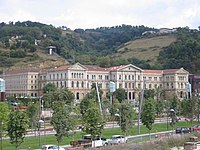University of Deusto
From Wikipedia, the free encyclopedia
| Universidad de Deusto | |
|---|---|

Bilbao campus.
|
|
|
|
|
| Motto: | Sapientia melior auro (Knowledge is better than gold) |
| Established: | 1886 |
| Type: | Catholic |
| Chancellor: | Peter Hans Kolvenbach, SJ |
| Vice-Chancellor: | Jesús María Eguíluz Ortuzar, SJ |
| Rector: | Jaime Oraá Oraá SJ |
| Faculty: | Business, Engineering, Law, Philosophy, Politics, Theology |
| Location: | Bilbao, |
| Campus: | Urban, Bilbao and San Sebastián |
| Affiliations: | Society of Jesus, CRUE |
| Website: | www.deusto.es |
The University of Deusto (Spanish: Universidad de Deusto, Basque: Deustuko Unibertsitatea) is one of the most distinguished academic institutions in Spain, with campuses in Bilbao and San Sebastián.
Contents |
[edit] History
The University of Deusto first opened in 1886, having been founded because of the Basque Country's desire to have its own university and the Society of Jesus's wish to move its School of Higher Studies in Laguardia to a more central place. A huge building was designed by architect Marquess of Cubas, which was at its time Bilbao's largest building. Now it's the main building of the campus situated opposite to the Guggenheim Museum, in the neighbourhood of Deusto, which gives the name to the university. The Business College of the University, founded in 1916, was the first college and the only one of its kind for nearly 50 years in Spain, which became the Faculty of Economics and Business Administration in 1973.
[edit] Civil War and Postwar
The advent of the Second Spanish Republic (1931) interrupted and altered university life at Deusto. On 23 January 1932, the Spanish Government dissolved the Company of Jesus by decree, and the University, owned by the Jesuits, was closed down. Some lectures still continued at the "Academia Vizcaína de Cultura" and the "Universidad Comercial" (Faculty of Economics) could carry on working as normal until the beginning of the Spanish Civil War.
During the war, the University of Deusto became a military base, but after the fall of Bilbao in 1937, it was turned into a hospital, food supply centre and concentration camp. It resumed classes in October 1940.
[edit] Official recognition
In 1962, the University was very well-known all along the Basque Country and also the whole Spain, and its former students excelled in the worlds of business, politics and culture. However, they had a drawback: their studies were not officially recognized by the State and they had to sit an examination at a State University. Society did not really take this circumstance into account, but action was taken so that official recognition was granted. On 5 April 1962, an agreement was signed between the Spanish Government and the Holy See that provided Catholic or Church Universities with a legal basis. On 10 August 1963, the University of Deusto received canonical approval by the Holy See. During September of that same year, it was recognized by the State, including its Faculties of Law and Philosophy and Arts (Modern Philology division). Since then, a fast increase on the number of students and centres went on. The growth began with a rise from 500 to 1,000 students, and to 2,700 five years later; ten years later there were 5,000 and at present it has reached 14,000 students. The rest of the faculties were successively recognized beginning with the Faculty of Economic and Business Sciences in 1973 and finishing with that of Computing Sciences in 1979 (which later became the Faculty of Engineering).
[edit] San Sebastián Campus
Its origin was ESSA in 1956. ESSA was the main body that started to teach these studies and assumed the ownership of current ESTE. In the beginning, Business Management, Law, Economic Sciences and Engineering Preparatory Courses were taught. The Society of Jesus was entrusted with its running and management. In 1960 this body was named EUG, and in 1963 the first stone of EUTG, University and Technical Studies of Guipúzcoa was laid. During 1979, the Faculty of Economic and Business Studies became a faculty dependent on UD and in 1990, the legal and real union of the San Sebastian centre took place as a second campus of the University of Deusto. Nowadays, it has the Faculties of Economic and Business Studies-ESTE, the Faculty of Humanities, the University School of Tourism and the University School of Social Work.
[edit] Famous people from Deusto
[edit] Faculty
- Pedro Arrupe, general of the Jesuits
- Francisco Gárate, a Jesuit janitor who was declared blessed.
- Xabier Arzalluz, former Jesuit, Basque nationalist politician, professor of law (in the Basque language)
- Andrés Ortíz-Osés, Philosopher.
[edit] Students
- José Antonio Aguirre, Basque president
- Mario Conde, business man, top graduate of his year of the Faculty of Law.
- Espido Freire, writer,[1]
- Joaquín Almunia, Former Secretary General of the PSOE and current European Commissioner for Economic and Monetary Affaires


